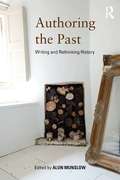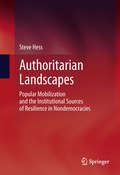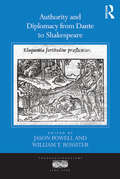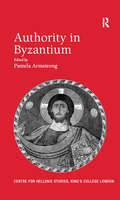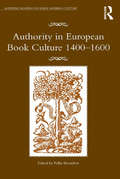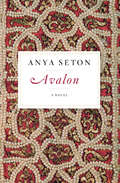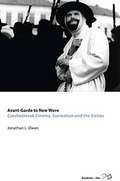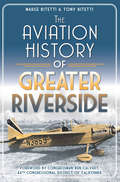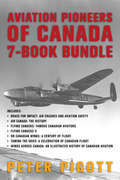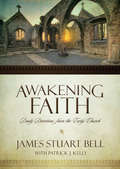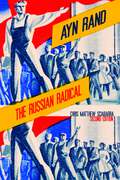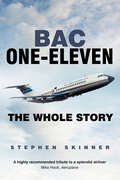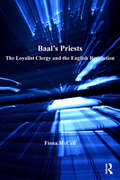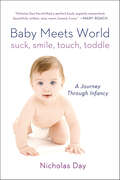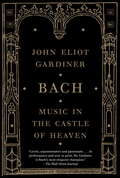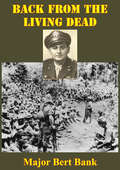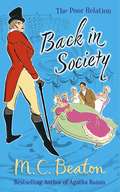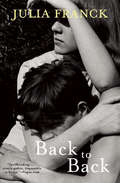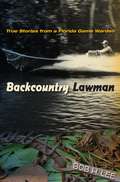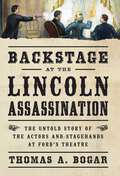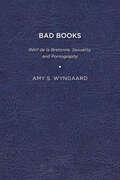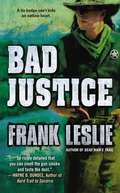- Table View
- List View
Authoring the Past: Writing and Rethinking History
by Alun MunslowPlease explain why you think about and write history as you do? Collecting together the responses to this question from 15 of the world’s foremost historians and theorists, Authoring the Past represents a powerful reflection on and intervention in the historiographical field. Edited by Alun Munslow and presented in concise digestible essays, the collection covers a broad range of contemporary interests and ideas and offers a rich set of reasoned alternative thoughts on our cultural engagement with times gone by. Emerging from an intensely fertile period of historical thought and practice, Authoring the Past examines the variety of approaches to the discipline that have taken shape during this time and suggests possible future ways of thinking about and interacting with the past. It provides a unique insight into recent debates on the nature and purpose of history and demonstrates that when diverse metaphysical and aesthetic choices are made, the nature of the representation of the past becomes a matter of legitimate dispute. Students, scholars and practitioners of history will find it a stimulating and invaluable resource.
Authoritarian Landscapes: Popular Mobilization and the Institutional Sources of Resilience in Nondemocracies
by Steve HessThe turbulent year of 2011 has brought the appearance of mass popular unrest and the collapse of long lived autocratic regimes in Egypt, Tunisia, Libya and possibly Syria. The sudden and unanticipated fall of these regimes - often thought of as exemplars of authoritarian resilience - has brought much of the conventional wisdom on the durability and vulnerability of nondemocratic regimes into question. This book seeks to advance the existing literature by treating the autocratic state not as a unitary actor characterized by strength or weakness but rather as a structure or terrain that can alternatively inhibit or facilitate the appearance of national level forms of protests. In the mode of the Arab Spring, the color revolutions of the former Soviet Union, and the people power movement of the Philippines, such movements overcome the daunting impediments presented by autocrats, appeal to likeminded counterparts across society, and overwhelm the ability of regimes to maintain order. Conversely, in other settings, such as contemporary China, decentralized state structures provide an inhospitable environment for national-level protest, leading collective actors to opt for more local and parochial forms of contention. This outcome produces paradoxical situations, such as in the PRC, where protests are frequent but national-level mobilization and coordination is absent.
Authority
by Frank FurediWhere schools in the past used to introduce young people to the norms and values of society, today it seems that schools are there primarily to deal with students' difficult behavior. The school has become a course in Life Skills. Students have to be taught to control their behavior. This shift in priorities has been fed largely by experts in education and other fields, and in so doing they have often pitted schools against parents. This is one of the dangers of the trend, but this kind of therapeutic education also leaves insufficient time and resources for teachers to intellectually stimulate their students.
Authority and Diplomacy from Dante to Shakespeare (Transculturalisms, 1400-1700)
by Jason Powell William T. RossiterA detailed examination of the relationship between the discourses and practices of authority and diplomacy in the late medieval and early modern periods, Authority and Diplomacy from Dante to Shakespeare interrogates the persistent duality of the roles of author and ambassador. The volume approaches its subject from a literary-historical perspective, drawing upon late medieval and early modern ideas and discourses of diplomacy and authority, and examining how they are manifested within different forms of writing: drama, poetry, diplomatic correspondence, peace treaties, and household accounts. Contributors focus on major literary figures from different cultures, including Dante, Petrarch, and Tasso from Italy; and from England, Chaucer, Wyatt, Sidney, Spenser, and Shakespeare. In addition, the book moves between and across literary-historical periods, tracing the development of concepts and discourses of authority and diplomacy from the late medieval to the early modern period. Taken together, these essays forge a broader argument for the centrality of diplomacy and diplomatic concepts in the literature and culture of late medieval and early modern England, and for the importance of diplomacy in current studies of English literature before 1603.
Authority in Byzantium (Publications of the Centre for Hellenic Studies, King's College London)
by Pamela ArmstrongAuthority is an important concept in Byzantine culture whose myriad modes of implementation helped maintain the existence of the Byzantine state across so many centuries, binding together people from different ethnic groups, in different spheres of life and activities. Even though its significance to understanding the Byzantine world is so central, it is nonetheless imperfectly understood. The present volume brings together an international cast of scholars to explore this concept. The contributions are divided into nine sections focusing on different aspects of authority: the imperial authority of the state, how it was transmitted from the top down, from Constantinople to provincial towns, how it dealt with marginal legal issues or good medical practice; authority in the market place, whether directly concerning over-the-counter issues such as coinage, weights and measures, or the wider concerns of the activities of foreign traders; authority in the church, such as the extent to which ecclesiastical authority was inherent, or how constructs of religious authority ordered family life; the authority of knowledge revealed through imperial patronage or divine wisdom; the authority of text, though its conformity with ancient traditions, through the Holy scriptures and through the authenticity of history; exhibiting authority through images of the emperor or the Divine. The final section draws on personal experience of three great ’authorities’ within Byzantine Studies: Ostrogorsky, Beck and Browning.
Authority in European Book Culture 1400-1600 (Material Readings in Early Modern Culture)
by Pollie BromilowThrough its many and varied manifestations, authority has frequently played a role in the communication process in both manuscript and print. This volume explores how authority, whether religious, intellectual, political or social, has enforced the circulation of certain texts and text versions, or acted to prevent the distribution of books, pamphlets and other print matter. It also analyzes how readers, writers and printers have sometimes rebelled against the constraints and restrictions of authority, publishing controversial works anonymously or counterfeiting authoritative texts; and how the written or printed word itself has sometimes been perceived to have a kind of authority, which might have had ramifications in social, political or religious spheres. Contributors look at the experience of various European cultures-English, French, German and Italian-to allow for comparative study of a number of questions pertinent to the period. Among the issues explored are local and regional factors influencing book production; the interplay between manuscript and print culture; the slippage between authorship and authority; and the role of civic and religious authority in cultural production. Deliberately conceived to foster interdisciplinary dialogue between the history of the book, and literary and cultural history, this volume takes a pan-European perspective to explore the ways in which authority infiltrates and is in turn propagated or undermined by book culture.
Availability of Credit and Secured Transactions in a Time of Crisis
by N. Orkun AkseliIn the light of the financial crisis, it has become clear that the globalisation of financial markets has not been matched by the globalisation of legal certainty relating to financial transactions. The ability to give security influences not only the cost of credit but also, in some cases, whether credit will be available at all. Increasing the availability and lowering the cost of credit can make an important contribution to international and domestic economic development. Assessing the international challenges posed by inefficient secured credit laws, this book explores how these can be overcome to facilitate credit through legal reforms. Leading authorities in the field address the key issues surrounding the availability of credit, the role of banks in economic development and financial crises, UNCITRAL's legislative efforts, and international organisations and financial institutions and their involvement in the reform of secured transactions law.
Avalon: A Novel (Coronet Bks.)
by Anya SetonA novel of England during the Viking era, from an author who &“has vividly and colorfully portrayed life during the tumultuous Dark Ages&” (Historical Novels Review). The last quarter of the tenth century was a time of conflict and exploration—while the Anglo-Saxons fought against the Vikings, Norsemen voyaged into the unknown looking for new lands to pillage, and so discovered America. Prince Rumon of France, descendant of Charlemagne and King Alfred, was a searcher. He had visions of the Islands of the Blessed, perhaps King Arthur&’s Avalon, &“where falls not hail, or rain, or any snow.&” Merewyn grew up in savage Cornwall—a lonely girl, sustained by stubborn courage and belief in her descent from great King Arthur. Chance—or fate—in the form of a shipwreck off the Cornish coast brought Rumon and Merewyn together, and from that hour their lives were intertwined. Bound by his vow to her dying mother, Rumon brings Merewyn safely to England, keeping hidden the shameful secret of her birth. He considers his responsibility ended. At court, he is dazzled by the beautiful Queen Alfrida—but when a murderous truth is revealed, he turns to Merewyn, only to discover that he may have lost her. And he will journey across the Atlantic to find her again . . . From the beloved bestselling author of Katherine and Dragonwyck, this is a romantic tale of history and adventure &“characterized by an authentic sense of time&” (The New York Times Book Review).
Avant-garde To New Wave
by Jonathan L. OwenThe cultural liberalization of communist Czechoslovakia in the 1960s produced many artistic accomplishments, not least the celebrated films of the Czech New Wave. This movement saw filmmakers use their new freedom to engage with traditions of the avant-garde, especially Surrealism. This book explores the avant-garde's influence over the New Wave and considers the political implications of that influence. The close analysis of selected films, ranging from the Oscar-winning Closely Observed Trains to the aesthetically challenging Daisies, is contextualized by an account of the Czech avant-garde and a discussion of the films' immediate cultural and political background.
Aviation History of Greater Riverside, The (Transportation)
by Marge Bitetti Congressman Ken Calvert Tony BitettiEver since aircraft changed the scope of the First World War, flight became both a passion and business in Riverside. Early barnstormers needed places to park, refuel and service their aircraft, so airports started popping up. Alessandro Field became March Field in 1918. By World War II, seventy-five thousand troops were deployed at March. Today's March Joint Air Reserve Base has been a vital wartime training and relay installation and a sentinel of peacetime. In 1925, Roman Warren, known as the "Cowboy Aviator," established Riverside Airport, which later became Flabob Airport. Take to the air with authors Marge and Tony Bitetti as they trace Greater Riverside's history of flight--from Banning, Corona and Riverside Municipal Airports to Perris Airport, Skylark Field and others.
Aviation Pioneers of Canada 7-Book Bundle: Brace for Impact / Air Canada / and 5 more
by Peter PigottThe Aviation Pioneers of Canada 7-Book Bundle presents the high-flying insight of Peter Pigott, in a special collection chronicling the aviators, aircraft, and drama of over a century of Canadian flight. From the Avro Arrow and the Silver Dart to the adventurers and visionaries who pushed Canadian airways to new heights, Pigott covers it all with his trademark breezy style and incredible historical photographs. Includes Brace for Impact: Air Crashes and Aviation Safety Air Canada: The History Flying Canucks: Famous Canadian Aviators Flying Canucks II On Canadian Wings: A Century of Flight Taming the Skies: A Celebration of Canadian Flight Wings Across Canada: An Illustrated History of Canadian Aviation
Awakening Faith: Daily Devotions from the Early Church
by James Stuart Bell Patrick J. KellyIn simple, updated language, Awakening Faith by James Stuart Bell provides a year of inspiring readings drawn from the earliest teachers and writers of the church—the Church Fathers. In every reflection you will be refreshed by deep wells of wisdom and spiritual insight. “In the age of Twitter and Facebook, where glib sayings abound, one yearns to read some deeper wisdom about life and faith on a regular basis. Well, here you have it, a compendium of wisdom, devotion, and biblical insight from some of the most thoughtful and faithful Christians from the early eras of the church's history. And in Facebook sized posts. That's a nice change of pace!” —Mark Galli, editor, Christianity Today
Ayn Rand: The Russian Radical
by Chris Matthew SciabarraAuthor of The Fountainhead and Atlas Shrugged, Ayn Rand (1905–1982) is one of the most widely read philosophers of the twentieth century. Yet, despite the sale of over thirty million copies of her works, there have been few serious scholarly examinations of her thought. Ayn Rand: The Russian Radical provides a comprehensive analysis of the intellectual roots and philosophy of this controversial thinker. It has been nearly twenty years since the original publication of Chris Sciabarra’s Ayn Rand: The Russian Radical. Those years have witnessed an explosive increase in Rand sightings across the social landscape: in books on philosophy, politics, and culture; in film and literature; and in contemporary American politics, from the rise of the Tea Party to recent presidential campaigns. During this time Sciabarra continued to work toward the reclamation of the dialectical method in the service of a radical libertarian politics, culminating in his book Total Freedom: Toward a Dialectical Libertarianism (Penn State, 2000). In this new edition of Ayn Rand, Chris Sciabarra adds two chapters that present in-depth analysis of the most complete transcripts to date documenting Rand’s education at Petrograd State University. A new preface places the book in the context of Sciabarra’s own research and the recent expansion of interest in Rand’s philosophy. Finally, this edition includes a postscript that answers a recent critic of Sciabarra’s historical work on Rand. Shoshana Milgram, Rand’s biographer, has tried to cast doubt on Rand’s own recollections of having studied with the famous Russian philosopher N. O. Lossky. Sciabarra shows that Milgram’s analysis fails to cast doubt on Rand’s recollections—or on Sciabarra’s historical thesis.
Ayn Rand: The Russian Radical (Re-reading The Canon Ser.)
by Chris Matthew SciabarraAuthor of The Fountainhead and Atlas Shrugged, Ayn Rand (1905–1982) is one of the most widely read philosophers of the twentieth century. Yet, despite the sale of over thirty million copies of her works, there have been few serious scholarly examinations of her thought. Ayn Rand: The Russian Radical provides a comprehensive analysis of the intellectual roots and philosophy of this controversial thinker. It has been nearly twenty years since the original publication of Chris Sciabarra’s Ayn Rand: The Russian Radical. Those years have witnessed an explosive increase in Rand sightings across the social landscape: in books on philosophy, politics, and culture; in film and literature; and in contemporary American politics, from the rise of the Tea Party to recent presidential campaigns. During this time Sciabarra continued to work toward the reclamation of the dialectical method in the service of a radical libertarian politics, culminating in his book Total Freedom: Toward a Dialectical Libertarianism (Penn State, 2000). In this new edition of Ayn Rand, Chris Sciabarra adds two chapters that present in-depth analysis of the most complete transcripts to date documenting Rand’s education at Petrograd State University. A new preface places the book in the context of Sciabarra’s own research and the recent expansion of interest in Rand’s philosophy. Finally, this edition includes a postscript that answers a recent critic of Sciabarra’s historical work on Rand. Shoshana Milgram, Rand’s biographer, has tried to cast doubt on Rand’s own recollections of having studied with the famous Russian philosopher N. O. Lossky. Sciabarra shows that Milgram’s analysis fails to cast doubt on Rand’s recollections—or on Sciabarra’s historical thesis.
BAC One-Eleven: The Whole Story
by Stephen SkinnerIn August 1963, one of the best-selling aircraft of British civil aviation, the BAC One-Eleven, took to the skies for the first time. With an order book for sixty aircraft, more than half were from the United States, which was an unprecedented situation for a British civil aircraft. The first project for the newly formed British Aircraft Corporation, the One-Eleven was wholly designed and built by BAC, and remained in production throughout the entire seventeen-year history of the organisation, performing strongly even when profits were at a low. After flying commercially in Europe for the last time in March 2002, here the One-Eleven is celebrated in style.
Baal's Priests: The Loyalist Clergy and the English Revolution (St Andrews Studies in Reformation History)
by Fiona McCallThe English Civil War was a time of disruption, suffering and persecution for many people, not least the clergy of the established church, who found themselves ejected from their livings in increasing numbers as Parliamentarian forces extended their control across the country. Yet, historians have tended to downplay their suffering, preferring in most cases to concentrate instead upon the persecution suffered by dissenters after the Restoration. Drawing upon an impressive array of sources - most notably the remarkable set of family and parish memories collected by John Walker in the early years of the eighteenth century - this book refocuses attention on the experiences of the sequestered loyalist clergy during the turbulent years of the 1640s and 1650s. The study highlights how the experiences of the clergy can help illuminate events in wider society, whilst at the same time acknowledging the unique situation in which Church of England ministers found themselves. For although the plundering, imprisonment and personal loss of the clergy was probably indicative of the experiences of many ordinary people on middle incomes, the ever present religious dimension to the conflict ensured particular attention was paid to those holding religious office. During the war and interregnum, zealous religious reformers attacked every aspect of established religion, targeting both existing institutions and those who supported them. Clergy were ejected on an unprecedented scale, suffering much violence and persecution and branded as 'malignants' and 'baal's priests'. By re-examining their history, the book offers a balanced assessment of the persecution, challenging many preconceptions about the ejected loyalists, and providing new insights into the experiences and legacies of this influential group.
Baby Meets World: Suck, Smile, Touch, Toddle
by Nicholas DayA dynamic new story about how babies make their way in the world—and how grown-ups have tried to make sense of these tiny inscrutable beings.As a new parent, Nicholas Day had some basic but confounding questions: Why does my son find the straitjacket of his swaddling blanket comforting and not terrifying? How can he never meet a developmental norm and still be OK? And when will he stop sucking my finger? So he went digging for answers. They were not what he expected.Drawing on a wealth of perspectives—scientific, historical, cross-cultural, personal—Baby Meets World is organized around the mundane activities that dominate the life of an infant: sucking, smiling, touching, toddling. From these everyday activities, Day weaves together an account that is anything but ordinary: a fresh, surprising story, both weird and wondrous, about our first experience of the world.Part hidden history of parenthood, part secret lives of babies, Baby Meets World steps back from the moment-to-moment chaos of babydom. It allows readers to see infancy anew in all its strangeness and splendor.
Bach: Music in the Castle of Heaven
by John Eliot GardinerJohann Sebastian Bach is one of the most unfathomable composers in the history of music. How can such sublime work have been produced by a man who (when we can discern his personality at all) seems so ordinary, so opaque--and occasionally so intemperate? John Eliot Gardiner grew up passing one of the only two authentic portraits of Bach every morning and evening on the stairs of his parents' house, where it hung for safety during World War II. He has been studying and performing Bach ever since, and is now regarded as one of the composer's greatest living interpreters. The fruits of this lifetime's immersion are distilled in this remarkable book, grounded in the most recent Bach scholarship but moving far beyond it, and explaining in wonderful detail the ideas on which Bach drew, how he worked, how his music is constructed, how it achieves its effects--and what it can tell us about Bach the man. Gardiner's background as a historian has encouraged him to search for ways in which scholarship and performance can cooperate and fruitfully coalesce. This has entailed piecing together the few biographical shards, scrutinizing the music, and watching for those instances when Bach's personality seems to penetrate the fabric of his notation. Gardiner's aim is "to give the reader a sense of inhabiting the same experiences and sensations that Bach might have had in the act of music-making. This, I try to show, can help us arrive at a more human likeness discernible in the closely related processes of composing and performing his music." It is very rare that such an accomplished performer of music should also be a considerable writer and thinker about it. John Eliot Gardiner takes us as deeply into Bach's works and mind as perhaps words can. The result is a unique book about one of the greatest of all creative artists.
Back From The Living Dead: An Original Story Describing The Infamous March Of Death; 33 Months In A Japanese Prison And Liberation By The Rangers
by Major Bert BankThe world famous story of Major Bertram Bert Bank who survived 33 months of prison, torture and starvation at the hands of the Japanese in the Philippines during the Second World War."He left us to go into service in 1941 and he was called up from inactive status on his reserve commission."From the time he left us until he came back this year, Bert went through a lot that many other men did not survive. He was taken prisoner of the Japs on Bataan, survived the Bataan March of Death and 33 months internment in a Jap prison camp. Now he's a patient at Valley Forge General Hospital where Army doctors are attempting to restore his sight to normal. The long, gruelling months on a meager diet took its toll."But Bert doesn't complain. "There are a lot of other fellows less fortunate than I," he will tell you."Many friends have asked him to tell of his experiences. During the course of bond tours and other public appearances in the Army's behalf, Bert has recounted these experiences. And so he thought he would write them down for these friends. That's the reason for this booklet."The story of his capture and internment are here in Bert's own words. He is the man identified as the Captain Bert of Alabama in the late Lieutenant Colonel Edward Dyess' story "The March of Death." Bert was scheduled to make a break from the Jap prison camp with Colonel Dyess but was sick at the time and could not make it."So this is the story of Major Bert Bank, a native Tuscaloosan and graduate of the University of Alabama. He's one of the men who came back from the "living dead.""
Back in Society (The Poor Relation #6)
by M.C. BeatonThe Poor Relation hotel is the toast of London and its owners are preparing to sell up and retire - but one last romantic adventure awaits them!Driven into hiding at the hotel by a tyrannous father and a rich but wizened suitor, Lady Jane Fremney attempts to end her life. The poor relations save the young lady and determine to improve her lot in life by bringing her out for the Season.All the young bucks call on Jane, among them the handsome but racy Comte de Mornay, an exile from Napoleon's France who has broken many a heart and so far eluded matrimony. Jane is quite adamant he is unsuitable for her - but when his life is threatened by an assassin's pistol, it is up to her to help him escape from danger... and into l'amour!
Back to Back (Books That Changed the World)
by Julia Franck&“[A] novel of fractured childhood in East Germany . . . a powerful elegy&” from the author of the international bestseller, The Blindness of the Heart (Booklist, starred review). Echoing themes of Julia Franck&’s German Book Prize–winning novel, The Blindness of the Heart, Back to Back begins in 1954 and centers around a single family living in Berlin in the socialist East. A cruel and unaffectionate mother, Käthe, is a sculptor of Jewish heritage, devoted entirely to becoming a success in the socialist state. Thomas and Ella&’s father emigrated to West Germany after World War II, and they deeply long to see him again. But Käthe&’s hard-nosed brutality—a reflection of the materialistic, unsentimental state in which she lives—means Thomas and Ella are unable to live the lives they want to. As the siblings grow up, &“the enchanted bubble of childhood fades, replaced by a sense of pitiless confinement—an ideological claustrophobia made concrete as the wall is constructed around them, touching off the book&’s devastating climax&” (Vogue). &“Like an expert geologist, Franck is digging deep into her family&’s extraordinary history creating things of great beauty from its dark recesses. Diamond-hard and full of glittering prose, Back to Back is a powerful and moving book. I suspect there are more gems to come.&” —Daily Telegraph &“Intoxicating . . . a curious fusion of stark realism tempered with quirkily stylistic flights of fancy: the trademark of one of Germany&’s finest contemporary novelists.&” —Literary Review &“Mournful and intense . . . captures a slice of life during a particularly harsh and brutal time and place, through the lens of a quickly disintegrating childhood innocence.&” —Bust Magazine
Backcountry Lawman: True Stories from a Florida Game Warden (Florida History and Culture)
by Bob H. LeeWith thirty years of backcountry patrol experience in Florida, Bob Lee has lived through incidents of legend, including one of the biggest environmental busts in Florida history. His fascinating memoir reveals the danger and the humor in the unsung exploits of game wardens.
Backstage at the Lincoln Assassination: The Untold Story of the Actors and Stagehands at Ford's Theatre
by Thomas A. BogarApril 14, 1865. A famous actor pulls a trigger in the presidential balcony, leaps to the stage and escapes, as the president lies fatally wounded. In the panic that follows, forty-six terrified people scatter in and around Ford's Theater as soldiers take up stations by the doors and the audience surges into the streets chanting, "Burn the place down!"This is the untold story of Lincoln's assassination: the forty-six stage hands, actors, and theater workers on hand for the bewildering events in the theater that night, and what each of them witnessed in the chaos-streaked hours before John Wilkes Booth was discovered to be the culprit. In Backstage at the Lincoln Assassination, historian Thomas A. Bogar delves into previously unpublished sources to tell the story of Lincoln's assassination from behind the curtain, and the tale is shocking. Police rounded up and arrested dozens of innocent people, wasting time that allowed the real culprit to get further away. Some closely connected to John Wilkes Booth were not even questioned, while innocent witnesses were relentlessly pursued. Booth was more connected with the production than you might have known--learn how he knew each member of the cast and crew, which was a hotbed of secessionist resentment. Backstage at the Lincoln Assassination also tells the story of what happened to each of these witnesses to history, after the investigation was over--how each one lived their lives after seeing one of America's greatest presidents shot dead without warning.Backstage at the Lincoln Assassination is an exquisitely detailed look at this famous event from an entirely new angle. It is must reading for anyone fascinated with the saga of Lincoln's life and the Civil War era.
Bad Books: Rétif de la Bretonne, Sexuality, and Pornography
by Amy S. WyngaardBad Books reconstructs how the eighteenth-century French author Nicolas-Edme Rétif de la Bretonne and his writings were at the forefront of the development of modern conceptions of sexuality and pornography. Although certain details are well known (for example, that Rétif’s 1769 treatise on prostitution, Le Pornographe, is the work from which the term pornography is derived, or that he was an avid foot and shoe fetishist), much of this story has been obscured and even forgotten: how the author actively worked to define the category of obscenity and the modern pornographic genre; how he coined the psycho-sexual term “fetish” and played a central role in the formation of theories of sexual fetishism in the late nineteenth and early twentieth centuries. Thus this book is also about literary history and how it is written: it explores how Rétif, perceived as a bad author in both senses of the term, and his contributions were glossed over or condemned, such that the originality of his texts has still not been fully established. Published by University of Delaware Press. Distributed worldwide by Rutgers University Press.
Bad Justice
by Frank LeslieSCARS RUN DEEP Colter Farrow's branded face is a constant reminder of why he's been on the run for so long. But his plan to return home and confront his past backfires when he's framed for the murders of two men. Men who turn out to be U. S. Deputy Marshals. Resigned to living on the lam, Colter heads to Utah Territory, where a desperate town marshal offers him a job as--of all things--a lawman. What better way for a man to hide from the law than to become part of it? Regardless of which side of the law he stands on, Colter makes enemies quickly. But Colter doesn't plan on letting them stay above ground for long. ... .
